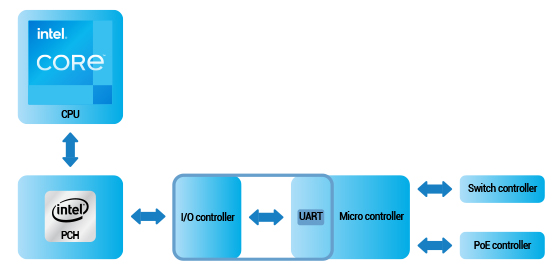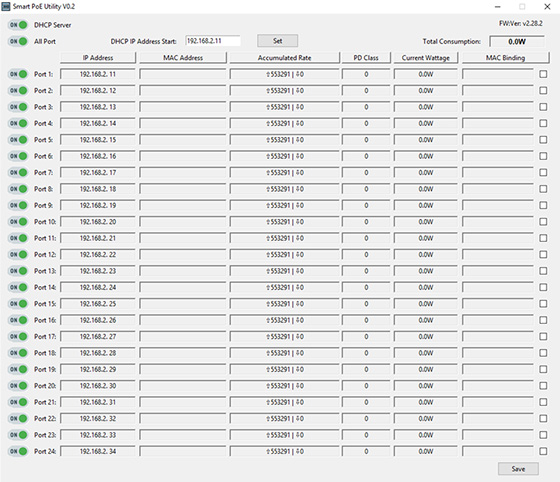A Powerful 1U Rackmount NVR with Optimized PoE Management Powered by Intel’s 14th Gen Core-i processor

Trend
In the 1U rackmount market, the increasing popularity of IP cameras has led to a growing need for monitoring the status and connection cameras. Users need to know in real-time whether the IP cameras are connected and transmitting data. Additionally, having PoE (Power over Ethernet) functionality is essential as it simplifies installation and the construction of application environments, eliminating the need for additional PoE switches to connect cameras and thereby reducing costs. Consequently, most VMS (Video Management System) software integrators require PoE management features to meet user demands. Customers also need SDKs or APIs for seamless and rapid integration with VMS software, making the timeliness of integrating PoE management functionalities particularly critical.
Challenge
Traditional PoE switch applications typically use network connections and manage PoE status via Simple Network Management Protocol (SNMP), this method of PoE management is difficult to incorporate into VMS software. Therefore, using serial interfaces (RS-232 or UART) for connections could provide a more effective and direct way to manage and monitor PoE status.
Solution
To enable more direct data communication, it has integrated a microcontroller to facilitate communication between the switch controller and the PoE controller. This is achieved through a UART interface connected to the I/O controller for PoE communication. This design architecture allows the system to quickly set and monitor the status of the switch and PoE through I/O access. The PoE communication design is shown in table I

Table I: PoE communication Design
With this PoE communication design, it is easy to develop and integrate PoE SDKs and APIs on both Windows and Linux platforms. Currently, the following features are provided to facilitate the identification and control of camera connections and usage.
- DHCP
- PoE link status (Detect)
- PoE On/Off (Per port)
- PoE On/Off (All Ports)
- IP Address
- Mac address
- Accumulated Traffic (MB)
- PD Class
- Single PoE wattage (Power output with Real-Time and MAX)
- Mac Binding (Lock Mac)
A specially, the DHCP functionality can directly assign IP addresses and corresponding ports through the Dynamic Host Configuration Protocol. By enabling the DHCP feature on the IP camera, it can automatically obtain the corresponding IP address for its port. This fixed port IP address simplifies the installation process, allowing installers to set up the system quickly and efficiently.
Additionally, for PoE port security, it provides MAC binding functionality, allowing users to bind the MAC address when connecting an IP camera. This prevents other devices with different MAC addresses from connecting to the NVR. The PoE communication SDK design is shown in Table II.

Table II: PoE communication SDK Design
Conclusion
The NViS 57164 / NViS 57244, goes beyond being powered by Intel® Core™i 14th Gen platform, by further providing enhanced PoE application control. This makes connecting IP cameras to the NVR more convenient and allows users to clearly understand the connection status of IP cameras through the SDK, facilitating quick integration for software developers. The NEXCOM NViS 57164 / NViS 57244 NVR breaks new ground by combining a 1U rackmount with PoE switch functionality, thus opening up and creating significant value.























